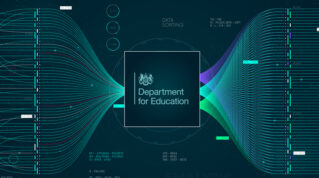Heading into a BETT event delayed by Covid is a timely reminder that, though the DfE may want schools to operate as normal, we are not there yet. Meanwhile, a highly anticipated schools white paper is struggling for front page space against a backdrop of conflict in Ukraine that has brought the states of the former USSR to the fore.
In that context, if asked to name a country with one of the highest-performing education systems in the world, it’s unlikely you would answer ‘Estonia’. But according to PISA, Estonia is in fact a world-leader, and one of the key ways they’ve achieved that is by thoroughly embedding technology in schools and classrooms. In Estonia, lessons are available online as standard. Even prior to the pandemic, students did digital home-learning days.
Estonia had the challenge and opportunity to reinvent itself after the fall of the USSR, allowing it to rebuild its education system from scratch. As a result, its government became one of the forerunners in equipping schools with solid digital infrastructure. Now, Estonian students are accustomed to online exams and timetables, with teachers setting tests and homework digitally. All of which massively reduces the hours teachers have to dedicate to marking, something British teachers consistently flag as a huge drain on their time.
Here, a workload crisis long predates Covid, and has only been worsened by it. Staff had to invent whole new ways of working at the height of the pandemic and are now feeling the burden of ensuring children catch up with what they missed. Reports tell us they are close to burn out, their physical and mental health is suffering and many are questioning whether to stay in the profession.
The threat of an exodus is real, and morale across the sector is reaching crisis point. The 2020 Teacher Wellbeing Index showed that almost two-thirds described themselves as stressed and almost three-quarters said they’d experienced behavioural, psychological or physical symptoms due to their work. Our children won’t receive a top-quality education if those providing it are run ragged.
With our system’s heritage comes baggage
Our education system has been idolised and romanticised across the globe for centuries, but with that heritage comes baggage. There’s a sense here that technology is about cutting costs or corners, and it’s often viewed with suspicion. But looking to countries like Estonia, the value digital classroom tools add when used to complement traditional teaching methods is clear.
Taking advantage of everything technology has to offer should be exciting. Used imaginatively, it opens up all sorts of possibilities for students and teachers. It can’t replace what teachers bring to the classroom, but it should be a core part of their toolbox. As a former teacher, I’m convinced that better integration of technology into our classrooms can help ease the burden.
The workload of teachers in Estonia has decreased consistently over the past seven years and they have almost twice as many teachers per pupil as England. In addition, they have no problems with teacher retention. In fact, a 2018 report from the OECD highlighted that 94 per cent of teachers in Estonia felt satisfied with their jobs. Another report found that they had high levels of job satisfaction due to a decent pay-to-workload ratio and low amounts of administrative work.
Our government’s go-to solution for retaining teachers is to raise their salary. But how can any increase now compete with a cost-of-living crisis? And anyway, how will it help retain all those who decided, during the pandemic, that life was about more than money?
The DfE has published an updated version of its education staff wellbeing charter. But while it acknowledges that protecting wellbeing is essential for improving morale and productivity, the government urgently needs to do more to deliver an improved workplace experience and a better work/life balance.
Re-examining our relationship with edtech can only help with that. And if the white paper doesn’t spell out a plan to do it, the government will only have to come back to it eventually.
How broken do we want our system to get before we choose to rebuild it?














Your thoughts